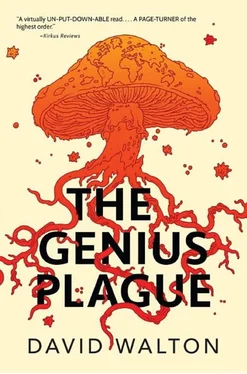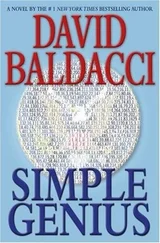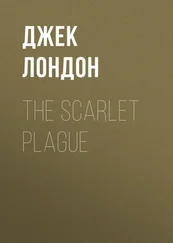“We added spores provided by Dr. McCarrick to the water treatment process, post-chlorination. The spores will pass from there into the drinking water for a large percentage of the population. Some have independent wells, of course, and those remain—”
“Does that work?” someone else asked. “I thought the spores were generally breathed into the lungs.”
“Dr. McCarrick performed tests in his lab and assures us that the fungus can take hold and make its way to the brain even when ingested.”
“I don’t believe this,” I said, standing. I was truly angry. “You intentionally infected thousands of innocent Americans with these slave spores? And Isleta Pueblo—isn’t that an Indian Reservation? You infected all of them, too? I thought this was a weapon to be used against the Ligados, not against uninfected civilians. How is this not worse than the problem you’re trying to fight?” To my surprise, several of the other high-ranking officers at the table agreed with me.
One of them stabbed his finger at the table. “Exactly what I’ve been saying. We’ve gone out of control here. We’re supposed to be protecting these people, not turning them into slaves.”
General Barron sat taller in his chair, somehow gaining height without standing, and stared them down. “Do you have a plan for defending them from the Ligados advance?” he demanded. No one answered. “Because I thought our mandate was to protect the base by any and all possible means. Or have you forgotten that we’re sitting on enough nuclear weapons to gut every major city in the country? Every one of those people will join the Ligados army if we leave them where they are. They’re in the wrong place at the wrong time, and I’m sorry for that. But keeping them neutral is not an option. When they pick up their hunting rifles and join the fight, I want it to be on our side.”
I turned and walked out of the room. I made it look like I just couldn’t stand to hear any more, but really, I had work to do. I had hoped to stop them from distributing McCarrick’s spores at all, but it appeared I was too late. I had to figure out where they were storing the spores before they used them on the advancing army. Without the spores, the defenders of the city would have no chance—there were too many Ligados already insinuated throughout their ranks, ready to turn on their friends when the time was right. None of them had the clearances and access to find and destroy the spores, however. That was my job.
I knew they would have to keep the spores in some kind of high-level biocontainment to avoid them getting out and infecting the wrong people. I also knew they would be well guarded. I needed to figure out where that might be, and how to get inside. But, first, I had to call my brother.
I couldn’t go back out the front door—Andrew and Shaunessy would still be there. I found another exit, but if it worked anything like the NSA buildings, the door would set off an alarm if you didn’t use a valid badge at the badge reader. I decided it was worth the risk. At Fort Meade, the things went off from time to time when people forgot to use their badges before hitting the crash bar. Besides, they’d be worried about somebody getting in, not somebody getting out. I pushed my way through. As I suspected, a high-pitched alarm sounded. I ignored it and turned left along the side of the building, away from the main entrance.
Several blocks away, I stopped. No one had seen me, as far as I could tell. I took out my phone and called a number my brother had given me before I left Brazil.
He answered after one ring. “Neil? Is that you?”
“Hi, Paul,” I said.
“Everything okay?” His voice sounded as clear as if he were standing next to me.
“How do you get such good reception in the middle of a rainforest?” I asked.
“I’m not in Brazil anymore. I’m in Mexico. Heading your direction, with a lot of other people.”
“Keep them dispersed,” I said. “Their spore stockpile is limited, so they’re looking for concentrations of people they can hit all at once.”
“Good to know,” he said. “We’ll do what we can to mitigate that. But Neil?”
“Yeah?”
“One of ours who works at Global Strike Command gave us some intelligence on the plane they’re going to use to make the drop. You’re the best asset in place to act on it. Are you free to move around?”
“For the moment. What’s the intel?” I already missed the direct connection through the fungal network that would have allowed me to know everything he knew without having to speak at all. I felt disconnected from the rest of the Ligados family.
Paul whistled rapidly, the tones leaping about in rapid succession. It was a form of communication derived from the Johurá whistle language, but advanced far beyond it in the content it could communicate. It was not a language anymore, not in the sense of symbolic words. It was more like data transferred as thought from one mind to another.
“I understand,” I said. “I’ll do what I can.”
“We’re counting on you, little brother.”
The bright sun baked me as I walked, though overall the temperature wasn’t as hot as I expected from a desert climate. The ground was flat and bare, except for the blue-gray mountains rising up out of the desert behind me. I could see the hangar long before I reached it, one of a trio of giant double cantilever monstrosities standing together on an ocean of tarmac.
I circled it, trying to look like I belonged there, and ignoring signs warning me that it was unlawful to enter the area without the permission of the base commander. I found an unmarked metal door at the side of the hangar, which, as Paul’s intel had promised, was unlocked. I opened it and slipped inside, squinting in the relative darkness.
Behind a bulky piece of machinery, under a tarpaulin, I found a pistol. It was small and compact, but I didn’t know guns well enough to recognize its type. My dad had a pistol, which I had fired at a range on several occasions as a teenager, but I was hardly a marksman. I slipped the pistol into the back waistband of my pants, like I had seen people do on TV.
I made my way past hanging parachutes and rolling maintenance ladders and stepped out into a cavernous space with a gently curving ceiling high above me. Dominating the space was the biggest airplane I had ever seen. Its wings stretched for what seemed like a mile in either direction from the rounded hump of its cockpit, without a sharp angle visible anywhere. Its stealth-black finish sucked away the light, and its long, curving shape suggested lethal precision. I recognized it as a B-2 Spirit, one of only twenty still in service, though I never imagined how intimidating it would look in real life. I knew it had the range to fly from here to São Paulo, drop its bombs, and fly back again.
This was the plane tasked with dropping McCarrick’s spores on the Ligados army. A bomber this powerful seemed like overkill for the mission, but, then again, if they were expecting significant antiaircraft defenses, the B-2 could hit them before they knew it was coming.
My job was to take it down.
I knew from the information Paul had communicated that there was a place in the body of the plane, near the refueling station, where I could hide and not be detected until takeoff. Once we were aloft, I was to come out of hiding with my gun and shoot both pilots in the back of the head. After that, I wouldn’t be able to keep the plane from crashing, since I hadn’t the first clue how to fly a Piper Cub, never mind a billion-dollar military aircraft. It was a suicide mission.
I didn’t mind. I thought I should mind, that it should bother me very much, but I was unable to summon the emotion. I was only one part of the glorious whole of what humanity was becoming with the help of Aspergillus ligados . I might die, but the future we were building would live on. I ignored the part of me deep inside that was quietly screaming.
Читать дальше












